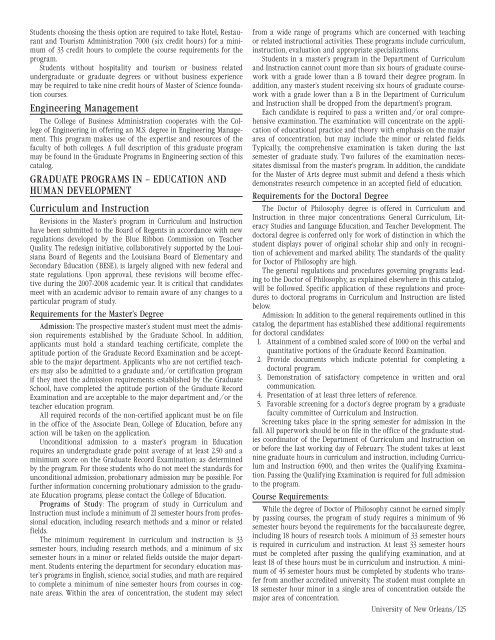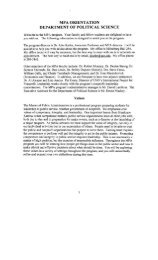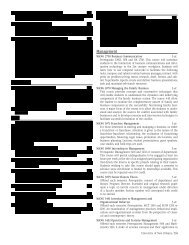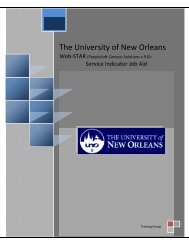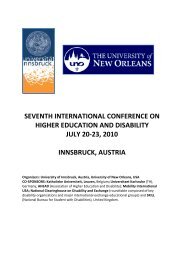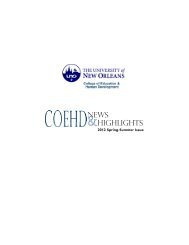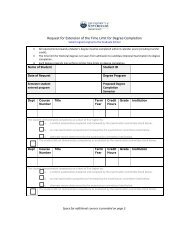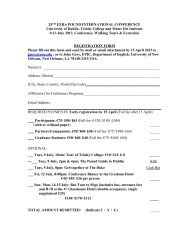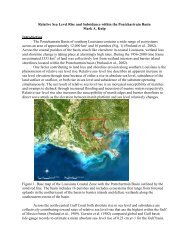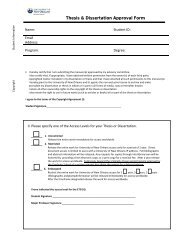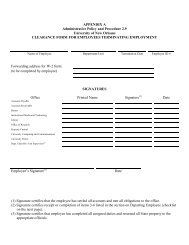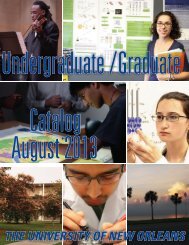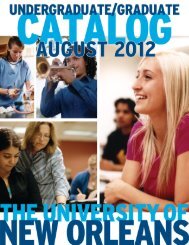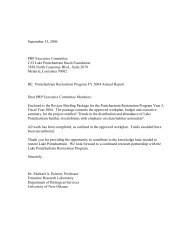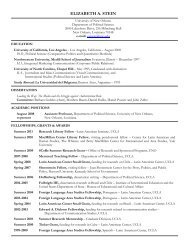Untitled - University of New Orleans
Untitled - University of New Orleans
Untitled - University of New Orleans
Create successful ePaper yourself
Turn your PDF publications into a flip-book with our unique Google optimized e-Paper software.
Students choosing the thesis option are required to take Hotel, Restaurant<br />
and Tourism Administration 7000 (six credit hours) for a minimum<br />
<strong>of</strong> 33 credit hours to complete the course requirements for the<br />
program.<br />
Students without hospitality and tourism or business related<br />
undergraduate or graduate degrees or without business experience<br />
may be required to take nine credit hours <strong>of</strong> Master <strong>of</strong> Science foundation<br />
courses.<br />
Engineering Management<br />
The College <strong>of</strong> Business Administration cooperates with the College<br />
<strong>of</strong> Engineering in <strong>of</strong>fering an M.S. degree in Engineering Management.<br />
This program makes use <strong>of</strong> the expertise and resources <strong>of</strong> the<br />
faculty <strong>of</strong> both colleges. A full description <strong>of</strong> this graduate program<br />
may be found in the Graduate Programs in Engineering section <strong>of</strong> this<br />
catalog.<br />
GRADUATE PROGRAMS IN – EDUCATION AND<br />
HUMAN DEVELOPMENT<br />
Curriculum and Instruction<br />
Revisions in the Master’s program in Curriculum and Instruction<br />
have been submitted to the Board <strong>of</strong> Regents in accordance with new<br />
regulations developed by the Blue Ribbon Commission on Teacher<br />
Quality. The redesign initiative, collaboratively supported by the Louisiana<br />
Board <strong>of</strong> Regents and the Louisiana Board <strong>of</strong> Elementary and<br />
Secondary Education (BESE), is largely aligned with new federal and<br />
state regulations. Upon approval, these revisions will become effective<br />
during the 2007-2008 academic year. It is critical that candidates<br />
meet with an academic advisor to remain aware <strong>of</strong> any changes to a<br />
particular program <strong>of</strong> study.<br />
Requirements for the Master’s Degree<br />
Admission: The prospective master’s student must meet the admission<br />
requirements established by the Graduate School. In addition,<br />
applicants must hold a standard teaching certificate, complete the<br />
aptitude portion <strong>of</strong> the Graduate Record Examination and be acceptable<br />
to the major department. Applicants who are not certified teachers<br />
may also be admitted to a graduate and/or certification program<br />
if they meet the admission requirements established by the Graduate<br />
School, have completed the aptitude portion <strong>of</strong> the Graduate Record<br />
Examination and are acceptable to the major department and/or the<br />
teacher education program.<br />
All required records <strong>of</strong> the non-certified applicant must be on file<br />
in the <strong>of</strong>fice <strong>of</strong> the Associate Dean, College <strong>of</strong> Education, before any<br />
action will be taken on the application.<br />
Unconditional admission to a master’s program in Education<br />
requires an undergraduate grade point average <strong>of</strong> at least 2.50 and a<br />
minimum score on the Graduate Record Examination; as determined<br />
by the program. For those students who do not meet the standards for<br />
unconditional admission, probationary admission may be possible. For<br />
further information concerning probationary admission to the graduate<br />
Education programs, please contact the College <strong>of</strong> Education.<br />
Programs <strong>of</strong> Study: The program <strong>of</strong> study in Curriculum and<br />
Instruction must include a minimum <strong>of</strong> 21 semester hours from pr<strong>of</strong>essional<br />
education, including research methods and a minor or related<br />
fields.<br />
The minimum requirement in curriculum and instruction is 33<br />
semester hours, including research methods, and a minimum <strong>of</strong> six<br />
semester hours in a minor or related fields outside the major department.<br />
Students entering the department for secondary education master’s<br />
programs in English, science, social studies, and math are required<br />
to complete a minimum <strong>of</strong> nine semester hours from courses in cognate<br />
areas. Within the area <strong>of</strong> concentration, the student may select<br />
from a wide range <strong>of</strong> programs which are concerned with teaching<br />
or related instructional activities. These programs include curriculum,<br />
instruction, evaluation and appropriate specializations.<br />
Students in a master’s program in the Department <strong>of</strong> Curriculum<br />
and Instruction cannot count more than six hours <strong>of</strong> graduate coursework<br />
with a grade lower than a B toward their degree program. In<br />
addition, any master’s student receiving six hours <strong>of</strong> graduate coursework<br />
with a grade lower than a B in the Department <strong>of</strong> Curriculum<br />
and Instruction shall be dropped from the department’s program.<br />
Each candidate is required to pass a written and/or oral comprehensive<br />
examination. The examination will concentrate on the application<br />
<strong>of</strong> educational practice and theory with emphasis on the major<br />
area <strong>of</strong> concentration, but may include the minor or related fields.<br />
Typically, the comprehensive examination is taken during the last<br />
semester <strong>of</strong> graduate study. Two failures <strong>of</strong> the examination necessitates<br />
dismissal from the master’s program. In addition, the candidate<br />
for the Master <strong>of</strong> Arts degree must submit and defend a thesis which<br />
demonstrates research competence in an accepted field <strong>of</strong> education.<br />
Requirements for the Doctoral Degree<br />
The Doctor <strong>of</strong> Philosophy degree is <strong>of</strong>fered in Curriculum and<br />
Instruction in three major concentrations: General Curriculum, Literacy<br />
Studies and Language Education, and Teacher Development. The<br />
doctoral degree is conferred only for work <strong>of</strong> distinction in which the<br />
student displays power <strong>of</strong> original scholar ship and only in recognition<br />
<strong>of</strong> achievement and marked ability. The standards <strong>of</strong> the quality<br />
for Doctor <strong>of</strong> Philosophy are high.<br />
The general regulations and procedures governing programs leading<br />
to the Doctor <strong>of</strong> Philosophy, as explained elsewhere in this catalog,<br />
will be followed. Specific application <strong>of</strong> these regulations and procedures<br />
to doctoral programs in Curriculum and Instruction are listed<br />
below.<br />
Admission: In addition to the general requirements outlined in this<br />
catalog, the department has established these additional requirements<br />
for doctoral candidates:<br />
1. Attainment <strong>of</strong> a combined scaled score <strong>of</strong> 1000 on the verbal and<br />
quantitative portions <strong>of</strong> the Graduate Record Examination.<br />
2. Provide documents which indicate potential for completing a<br />
doctoral program.<br />
3. Demonstration <strong>of</strong> satisfactory competence in written and oral<br />
communication.<br />
4. Presentation <strong>of</strong> at least three letters <strong>of</strong> reference.<br />
5. Favorable screening for a doctor’s degree program by a graduate<br />
faculty committee <strong>of</strong> Curriculum and Instruction.<br />
Screening takes place in the spring semester for admission in the<br />
fall. All paperwork should be on file in the <strong>of</strong>fice <strong>of</strong> the graduate studies<br />
coordinator <strong>of</strong> the Department <strong>of</strong> Curriculum and Instruction on<br />
or before the last working day <strong>of</strong> February. The student takes at least<br />
nine graduate hours in curriculum and instruction, including Curriculum<br />
and Instruction 6900, and then writes the Qualifying Examination.<br />
Passing the Qualifying Examination is required for full admission<br />
to the program.<br />
Course Requirements:<br />
While the degree <strong>of</strong> Doctor <strong>of</strong> Philosophy cannot be earned simply<br />
by passing courses, the program <strong>of</strong> study requires a minimum <strong>of</strong> 96<br />
semester hours beyond the requirements for the baccalaureate degree,<br />
including 18 hours <strong>of</strong> research tools. A minimum <strong>of</strong> 33 semester hours<br />
is required in curriculum and instruction. At least 33 semester hours<br />
must be completed after passing the qualifying examination, and at<br />
least 18 <strong>of</strong> these hours must be in curriculum and instruction. A minimum<br />
<strong>of</strong> 45 semester hours must be completed by students who transfer<br />
from another accredited university. The student must complete an<br />
18 semester hour minor in a single area <strong>of</strong> concentration outside the<br />
major area <strong>of</strong> concentration.<br />
<strong>University</strong> <strong>of</strong> <strong>New</strong> <strong>Orleans</strong>/125


